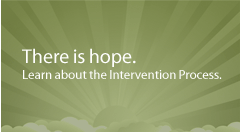


"With your direction, Bruce, our family has found hope and a path for happiness. Thank you so much."

Characteristics of Addiction
to the family
Alcoholism and drug addiction do not have a single cause and there are several genetic markers that come into play. Research has shown clear patterns of inheritance of physiological characteristics of at least fifty percent of alcoholics. Trying to figure out whether you or someone you know has crossed the line from abuse to addiction is often difficult, especially with young people. The characteristics of addictive behavior will vary depending on the addiction. We believe it is a family illness and eveyone has been effected and can have a part in the recovery process. When family gets involved, the chance of recovery for the addict is multiplied, and vice versa.
As abuse turns to addiction, the addict will become less and less reponsible. This will show itself in many areas such as driving under the influence, late or nonpayment of bills, lack of self care, in fact, most will progress to the point of damaging their own health. Often legal problems begin to show up such as DUI, dealing drugs or neglecting children. Relationships become difficult because as the individual becomes less responsible, the need for people in their lives who are willing to be over-responsible becomes necessary for survival. An example might be in the area of dealing with emotions. One of the key traits of addiction is the use of something, alcohol, drugs, food, gambling, sex, money or even work, for the purpose of medicating or numbing emotions. This is often unconcious, but not always. In relationships with people who are not taking responsibility for their own emotions, the other person will be over-responsible, taking the blame, apologizing, maybe even believing that an anger outburst from your loved one might actually be your fault. Even when the friend or family member realizes that he or she is not responsible for anyone else's anger, the pattern of blame continues. You didn't say or do something in "the right way." This is one area that is dealt with in treatment and why it is important for family members and/or close friends to be involved in the family program that most treatment centers offer and include in the treatment program.
Symptoms of addiction, to alcohol or anything else, also includes denial. It is powerful that someone in the throws of addiction can be in such a state of denial. They may acknowledge there is a problem, but will say they can handle it themselves, or the problem is something else. Many times there actually is another problem, or diagnosis, and they are self-medicating. This is seen with many other medical and mental health issues, but the addiction must be dealt with first. Counseling doesn't work very well with an impaired client. Denial also often affects those who are close to an addict.
The diagnostic process is done at the treatment center or hospital, after the intervention. Symptoms often overlap with other mental and physical issues. When we see more clearly what the problem truly is, we are better able to find solutions.
Service Area

Perkins Intervention's main service areas are in Indiana and surrounding states, including Indianapolis, Fort Wayne, Bloomington, LaFayette, or Muncie, IN, Louisville, KY, Cincinnati, OH or Eastern IL or Southern Michigan. Occasionally, there is a need to travel to one coast or the other, particularly Florida. If Bruce cannot travel or is already booked for the time you want, he can and does recommend other intervention specialists.
Recent Articles
Characteristics of Addiction
Alcoholism and drug addiction do not have a single cause and there are several genetic...The Myth of Hitting Bottom
Many have heard the myth of hitting bottom. It is a belief that people cannot get...Intervention
"Intervention is your way to say "We love you," Perkins said...
